College of Human Sciences
Unisa pioneers just energy transition agenda
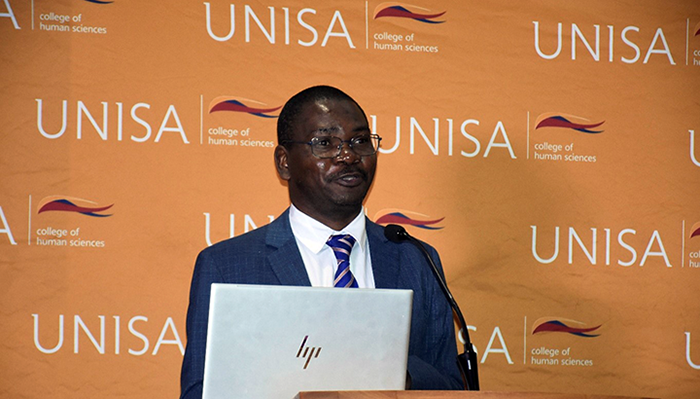
Prof Sampson Mamphweli, Head of the Energy Secretariat at the South African National Energy Development Institute, delivered the keynote address
On 22 September 2025, Unisa’s College of Human Sciences hosted its inaugural Energy Indaba under the theme Advancing an inclusive just energy transition agenda through multi-, inter-, intra- and transdisciplinary collaboration. The indaba highlighted the university’s efforts in advancing its Energy Catalytic Niche Area through teaching and learning, research and engaged scholarship.
Delivering the welcome address, Prof Tennyson Mgutshini, Executive Dean of the College of Graduate Studies, said that through this catalytic niche area, the university aims to solve energy-related challenges locally and continentally. He asserted that for other catalytic niche areas to function, they need energy. Mgutshini also pointed out that the indaba was instrumental in discussing great ideas that can have a significant impact on energy-related challenges.
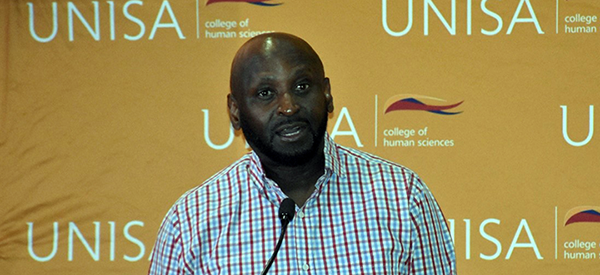
Prof Tennyson Mgutshini, Executive Dean of the College of Graduate Studies
Providing context, Prof Zethu Nkosi, Executive Dean of the College of Human Sciences, recognised Dr Kholofelo Moeng, Lecturer in the Department of Development Studies, who recently obtained a PhD degree. Nkosi indicated that Moeng’s groundbreaking thesis on A just transition to a low-carbon, climate-resilient economy in South Africa highlights the just energy transition, a decarbonisation approach that balances environmental sustainability with social equity.
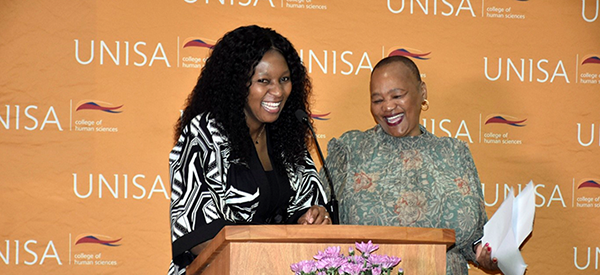
Dr Kholofelo Moeng, Lecturer in the Department of Developmental Studies, and Prof Zethu Nkosi, Executive Dean of the College of Human Sciences
South Africa’s journey to Just Energy Transition
Delivering the keynote address, Prof Sampson Mamphweli, Head of the Energy Secretariat at the South African National Energy Development Institute, spoke on the topic of South Africa’s journey towards decarbonising the power sector and managing electricity costs, reflecting on policy development. He defined just energy transition as a strategic framework for shifting towards a low-carbon economy while ensuring social and economic equity. He also pointed out that it prioritises the transition from coal-based power to renewable energy sources, such as wind and solar, aiming to reduce emissions while maintaining energy security. Highlighting the value of energy transformation, Mamphweli further added that the framework emphasises inclusive growth and the protection of workers and communities dependent on fossil fuel industries through job creation and economic diversification.
Mamphweli cautioned that job losses are likely to occur during this transition, noting that it is essential to implement measures to mitigate this negative impact. Furthermore, he reminded the attendees that South Africa had chosen the concept of a low-carbon economy to indicate that its intention was not to discard coal, gas and fossil fuels entirely, but to transition towards a low-carbon economy.
Ensuring an effective just energy transition
The indaba’s first panel discussion included Dr Phindile Masangane (Head of Strategy and Business Development: Africa Energy Corporation), Sbonelo Mbatha (co-founder and Director: PetroCONNECT), Sandile Swana (engineer, political analyst and CEO of Africa Media Online), Popi Njapha (Chief Engineer: National Transmission Company of South Africa) and Simphiwe Ngwenya (Climate Mitigation Senior Manager: Presidential Climate Commission).
The session focused on an inclusive, affordable and socially just energy transition, highlighting that countries are in a climate crisis due to the use of fossil fuels and that greenhouse gas emissions pose a threat to humanity. The panel further reiterated that the transition must reflect the lived realities of South Africans, as well as a need to expand hydroelectric power, nuclear power, wind power and solar power, while strengthening the baseload from well-maintained and environmentally compliant coal power stations.
The role of higher education in building skills in just energy
The second panel discussants included Phelisa Nkoma (Development Economist and co-founder: Women's Economic Assembly), Dr Koketso Rakhudu (Chief of Tsitsing community: Royal Bafokeng Nation), Refilwe Sebothoma (CEO of Hakem Energies), Commissioner Boitumelo Molete (Social Development Policy Coordinator and Co-lead on Climate Change and Just Transition: COSATU) and Dr Seithati Motebang (Senior Lecturer: Department of Development Studies).
Contributing to the subject, the panellists unpacked what energy democracy means and the role of higher education in upskilling and reskilling vulnerable groups. They noted that in rewriting energy history, it is essential to incorporate ideas from engagements like this indaba, adding that the event should not be merely a data collection exercise, but rather implement the recommendations. Importantly, they emphasised that community engagement must be prioritised in the energy transition framework, and communities must be part of the decision-making process. Moreover, they cautioned about the loss of jobs that will result from the closure of coal mines. Therefore, the panellists reiterated that it is paramount to protect decent work, advocate for energy democracy, and upskill and reskill workers to transition smoothly to a just energy system.
* By William Thubakgale, Communications Directorate, Department of Institutional Advancement
** Photography by Katlego Pilane, Communications and Marketing, College of Human Sciences
Publish date: 2025-10-07 00:00:00.0


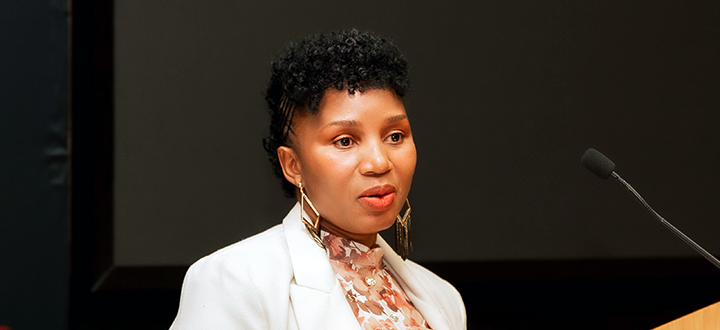 Wings of opportunity: Bringing drones into the classroom
Wings of opportunity: Bringing drones into the classroom
 Visionary youth champion to address Unisa’s Innovation Festival
Visionary youth champion to address Unisa’s Innovation Festival
 Finding the strength to persevere
Finding the strength to persevere
 Disability awareness at Unisa: Disability is not inability
Disability awareness at Unisa: Disability is not inability
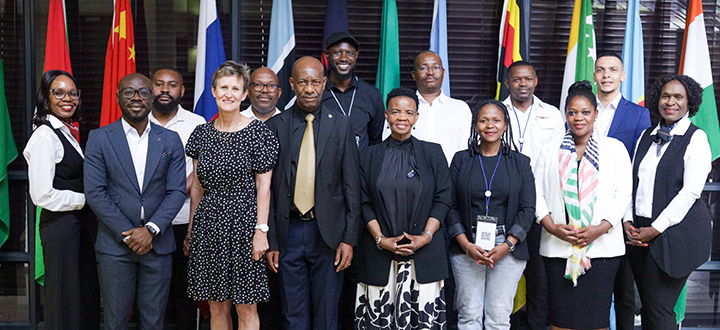 Unisa symposium shares knowledge on building SA's aviation economy
Unisa symposium shares knowledge on building SA's aviation economy